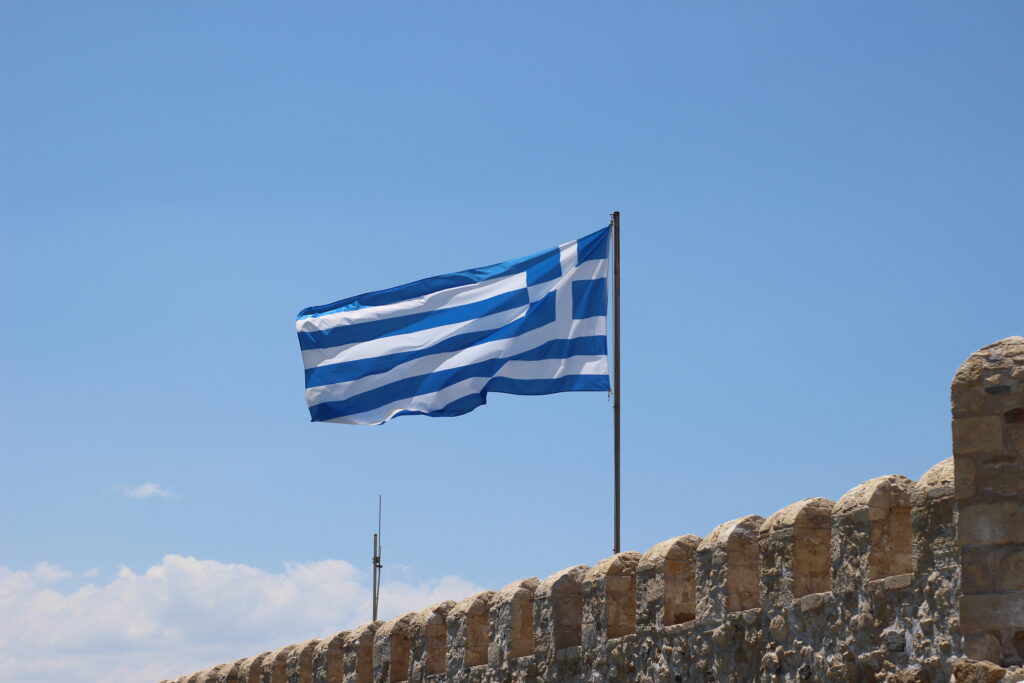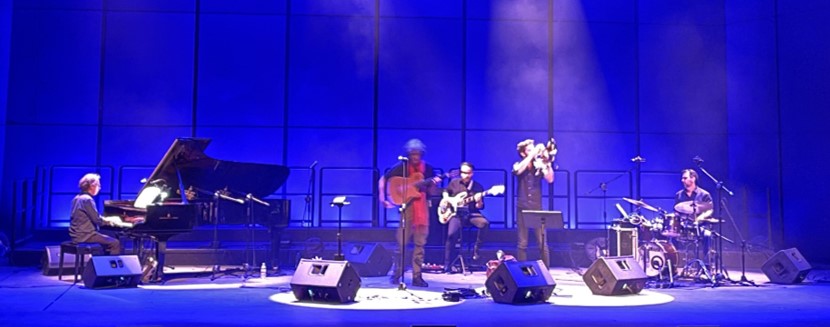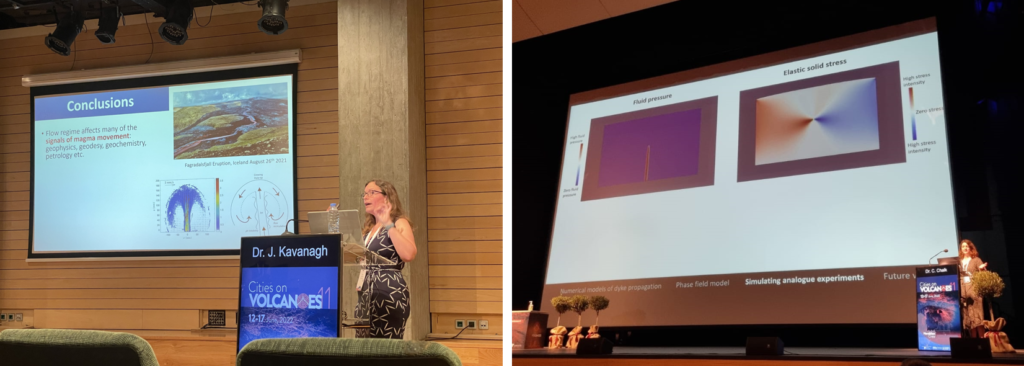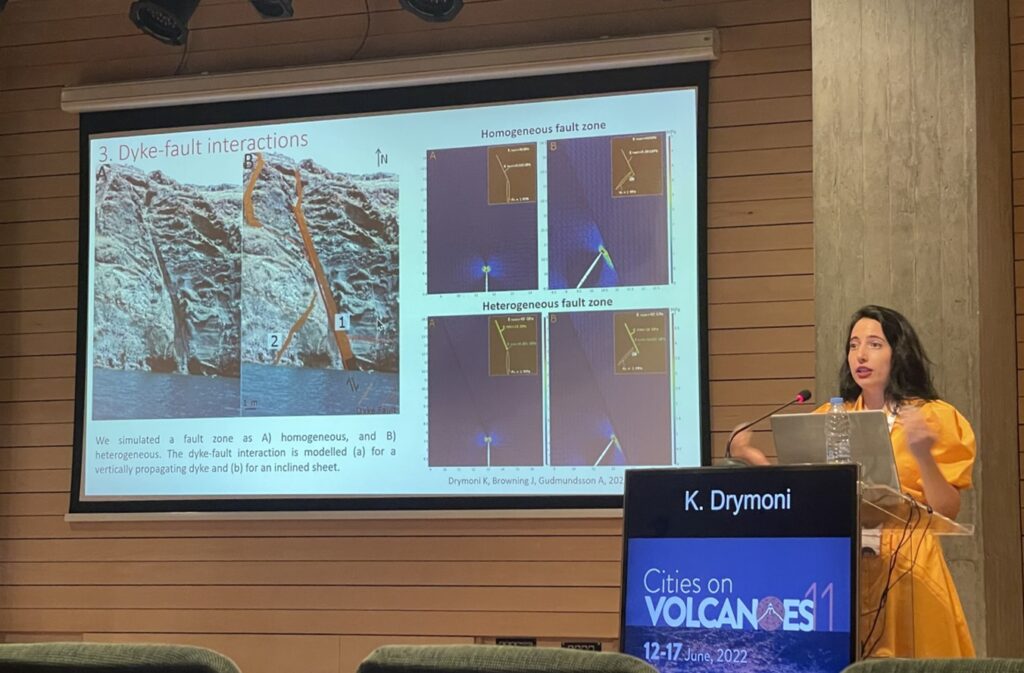Earlier this summer in mid-June, the 11th Cities on Volcanoes conference (aka COV11) took place in Herakalion, Crete. Although the city of Heraklion is not literally situated on a volcano, it is located in close proximity to the small island of Santorini – home to the infamous volcano responsible for one of the largest eruptions of human time. Another neighbouring volcano of significance is the very active Nisyros volcano. To accommodate the large number of enthusiastic volcanologists, this year’s conference was held in the Cultural-Conference Centre of Heraklion, catering for both virtual and in-person attendance.
Two VIPS committee members, Janine Kavanagh (president) and Caitlin Chalk (blog editor), attended COV11, and are hoping to share their exciting experience with the rest of the VIPS community. Whilst they were there, they also spoke to Kyriaki Drymoni – a Greek national and postdoc researcher at the Università degli Studi di Milano-Bicocca – who was involved in the organisation of COV11.

Attendees of COV11 were warmly welcomed to Crete, and in the opening ceremony were treated to a mesmerising and atmospheric Aegean Jazz performance by the esteemed Vasilis Rakopoulos quintet. This was then followed by four days of fascinating research talks under the theme of Volcanoes and Society: environment, health and hazards, which were spread across parallel sessions in rooms named after famous Greek volcanoes (Thira (now Santorini), Milos, Nysiros, and Methana). The conference closed in memorable fashion with a traditional Cretan night of live music, dancing from the Akrites Traditional Dance Association, and local delicacies. New, multidisciplinary research in volcanology combined with Cretan entertainment and hospitality made for a unique and thoroughly enjoyable experience for the attendees of COV11,

Prof. Floyd McCoy from the University of Hawaii gave a riveting keynote lecture on The Life and Death of a Bronze Age City by Volcanism. This talk focused on the Minoan civilisation living within the valley of Akrotiri on Santorini, which was destroyed by volcanic eruptions in the 16th century. Prof McCoy discussed the eruption’s five distinct stages, deciphered through stratigraphic deposits from the Late Bronze Age, alongside explaining how the sturdy Minoan architecture led to the excellent preservation of some parts of Akrotiri. Many conference attendees later learned more about the Minoan culture at the conference fieldtrip to the Archaeological Museum of Heraklion, which included a guided tour of Minoan artefacts.
There were many conference talks and sessions of particular appeal to those of us who are interested in volcanic plumbing systems. For example, Rates and dates: magmatic and volcanic processes from source to surface contained a diverse range of talks related to subsurface magmatic processes. In this session, Janine presented her research on fluid flow regimes in analogue dyke experiments. Caitlin spoke about numerically simulating the analogue dykes in a session on Pre-eruptive magmatic processes and their timescales: how to utilize them for the mitigation of volcanic risk?

The volcanology of Santorini was a common theme throughout the conference, showcasing how active research is on this volcanic area. Kyriaki Drymoni presented her work on the Spatial and temporal volcanotectonic evolution of Santorini volcano. She showed a combined approach of field work and numerical modelling applied to the complex network of magma intrusions exposed at the volcano, resulting from dyke-fault interactions. You can read more about this work in Kyriaki’s recent Bulletin of Volcanology paper.
Kyriaki, who is a local resident of Santorini, also played a significant role in organising the conference. She convened two sessions, helped organise the IAVCEI ECR-net networking social event, and co-led the post-conference fieldtrip to Nea Kameni – a small island within the flooded Santorini caldera! After the conference, Kyriaki spoke to the VIPS blog team about her experience:

How did you feel about the conference being held so close to your home in Santorini?
Kyriaki: I remember myself being so thrilled about Greece hosting COV11! It was almost like we were hosting the Olympic games! I felt extremely happy but even more honoured for having the opportunity to co-lead the Santorini fieldtrip. Santorini is not only my home but also the volcano I have studied for the last eight years, and what’s more exciting than exploring Nea Kameni with so many experts and volcanophiles? After COV11, I have learned a lot, allowing me to improve myself in many different ways. I look forward to participating in a future conference that is held in Santorini this time!
What did you enjoy most about your role in organising the conference?
As a PhD student in 2017, I participated in the IAVCEI conference in Portland and attended the post-conference fieldtrip around the Cascades. I won’t forget my enthusiasm as a participant when I returned, but most importantly, the skills gained from the organised events and the great knowledge from the fieldtrip. So, I was excited to have this opportunity to commit to these roles, especially when COV was happening for the first time in my country!

Since I was 18, I have worked in admin roles in the touristic sector of Santorini, helping my family. I have to admit that this allowed me to enhance my organisation skills and prepare me for the conference. During my PhD I also worked as an assistant in various related roles – I am delighted to help when possible. I am excited to see happy and satisfied faces!
Did Cities on Volcanoes inspire you with your research going forward?
This is a big ‘Absolutely’! Despite all conferences helping scientists from around the world to exchange ideas, meet their peers, interact, and establish collaborations, COV is focused on volcanic hazards and their interconnections with humans and the environment. COV allowed me to meet people who work in roles I have no experience in, which was invaluable. It makes you a better scientist and human being. Moreover, after the last ‘virtual’ years, it was so fulfilling to watch people presenting their work live! Such outstanding work and so inspiring!
Till our next stop now! Rotorua!

The VIPS blog team thanks Kyriaki for this insight on her experience at COV11 and we also say a big ‘congratulations’ to the conference organisers for throwing such a successful hybrid event in the amazing city of Heraklion. You can read more about the Cities on Volcanoes conference in this USGS article from the Hawaiian Volcano Observatory.
The next conference for VIPS enthusiasts is the IAVCEI Scientific Assembly 2023, Rotorua, New Zealand, from the 30 January – 3 February. We are particularly excited about the VIPS-hosted session on the Architecture and dynamics of volcanic plumbing systems, with a keynote talk from Teresa Ubide. We encourage abstract applications for this session up until the deadline of 2nd September.
Would you like to be featured on our blog?
We are on the hunt for fellow VIPS enthusiasts to share their stories, whether you’re a student, an early career researcher (ECR) or more experienced researcher – we want to hear from you!
Do you have a new paper to tell the world about? Or have you been involved in some exciting fieldwork recently? Get in touch at info@vipscommission.org to tell us what’s going on in your field of VIPS.

 We’re Expanding!
We’re Expanding!
Leave a Reply